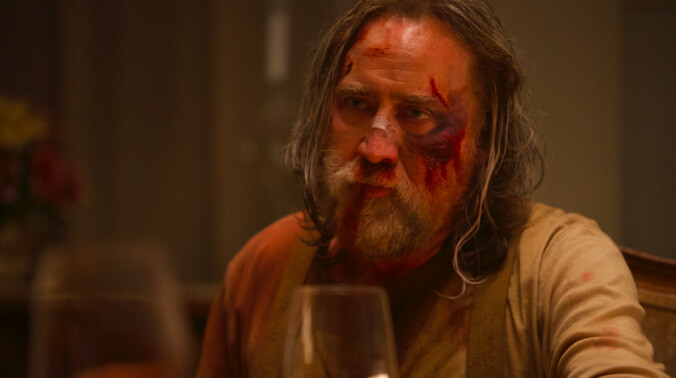Pig is so much richer and stranger than the Nicolas Cage revenge thriller it appears to be
This is much more than a movie where Nic Cage hunts down the men who kidnapped his beloved hog

In bare description, Pig sounds simple, straightforward, almost inevitable. How did Nicolas Cage get this many years into his long, eccentric career before finally taking on the role of an angry hermit pursuing the assholes who stole his beloved pet porker? Whatever form you might imagine such a movie would take, however, it’s not even remotely what Cage and fledgling writer-director Michael Sarnoski have in mind. From this superficially goofy, lowbrow premise, they’ve crafted a quasi-philosophical odyssey—one that, while not devoid of violence or humor, largely focuses on exploring the nature of creativity, passion, loss, and love. It’s at once ludicrous and deeply felt, anchored by a lead performance that balances manic intensity with uncharacteristic restraint in ideal proportion. Not since Drive, perhaps, has an apparent action film swerved so far from its designated lane, to such unexpectedly magnificent effect.
Those who saw this spring’s documentary The Truffle Hunters will already be familiar with Pig’s initial dynamic, which sees a grizzled, heavily bearded guy named Rob (Cage) search the Oregon woods in which he lives for valuable fungi, assisted by his sole companion in life. He then sells the truffles to Amir (Alex Wolff), an irritatingly yuppie-ish kid who shows up once a week in a yellow Camaro and attempts in vain to engage Rob in casual, innocuous conversation, as if the latter isn’t clearly about one step removed from being Ted Kaczynski. Amir does come in handy as a chauffeur, however, after unseen figures assault Rob and steal his pig, leaving him bereft not so much of his livelihood but of the only thing in his life about which he still gives a damn. The two of them head to Portland in an effort to track down the purloined animal, interrogating various members of the city’s fine-dining underworld, all of whom seem to know Rob by sight, name and/or near-legendary reputation.
Wait—“fine-dining underworld”?! Pig’s milieu isn’t quite what you’d call fantastical, but Sarnoski (who conceived the film’s story with producer Vanessa Block) deliberately heightens that aspect a smidge, even as he keeps everything else securely grounded. Imagine a cross between Gordon Ramsay and Tyler Durden for a sense of how Rob moves through this world, and the extent to which he’s regarded with a mixture of awe, fear and open hostility. It’s evident from the film’s first few minutes that this character has a tragic backstory, and among the film’s many pleasures is the facility and precision with which Sarnoski gradually parcels out crucial information while allowing what’s not especially important to remain a tantalizing mystery. There are no plot twists, in the traditional sense, but each successive encounter reveals a new facet that enriches the tale. At the same time, Pig is aggressively allergic to spoon-feeding and hand-holding, content to let us speculate internally about who certain people are, why a lie gets told, exactly what robbed Rob of his former existence. Even an old cassette tape that looks suspiciously like the setup for a climactic revelation turns out, at the end, to be something quite different (and lovely).
None of this would work without Cage’s commitment to the idea of Rob as both arrestingly iconic and resolutely human. Few of the things Rob does are wholly credible—least of all his refusal to accept any treatment for his many wounds, just letting the blood dry and cake on his face throughout, undisturbed—but his emotions are so raw and forceful that they fling your disbelief skyward until it winds up in orbit, well out of your way. Sarnoski, making his first feature, supports his star with moments of ethereal beauty (the back of Rob’s head as his long, matted locks are blown by the wind, with the Camaro’s bright yellow side mirror dominating the frame’s right half, out of focus through the open window), abrupt cuts that signify mental turmoil (Amir gets only halfway through his frustrated parting words: “Okay, you know what? Fu—”), and the confidence to let key scenes play out at a distance. Like the animal itself, Pig is considerably smarter and more ardent than it appears at first glance, and unearths treasures that are barely evident on the surface level. We’d have settled for much less, but what a rare treat to be offered a great deal more.